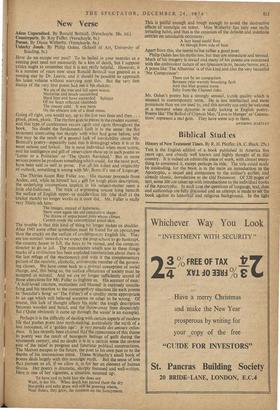New Verse
How do we escape our past? To be hailed in your twenties as a coming poet need not necessarily be a kiss of death, but I suppose critics ought to remember that it is not really helpful. However, it is a number of years now since Ronald Bottrall was greeted as a coming star by Dr. Leavis, and it should be possible to approach his latest volume without worrying over this. But the very first stanza of the very first poem had me a bit shaken:
We ate of the tree and fell upon winter.
Nectarine and peach succumbed Hard hips and haws succeeded. Splinter Of my heart reflected (dumbed) The uneasy cold. It was noon On the obscure side of a dead moon.
Going all right, you would say, up to the last two lines and then . . • plonk, plonk, plonk. The rhythm goes to pieces in the crudest manner, and this type of carelessness occurs again and again throughout the book. No doubt the fundamental fault is in the sense: the flat statement contrasting too sharply with what had gone before, and this may be the result of a general lack of inevitability about Mr. Bottrall's poetry—especially (and this is damaging) when it is at its most serious and lyrical. He is most individual when most satiric, and his intelligence and gift of observation show up in such poems as 'Letter to a Politician' or 'The Quorn Revisited.' But in more serious poems he produces something which could, for the most part, have been said as well in prose. For all his talent and originality of outlook, something is wrong with Mr. Bottrall's use of language.
The Thirties haunt Roy Fuller too. His manner proceeds from Auden, and, while he himself has a gift for tough plain description, the underlying assumptions implicit in his subject-matter seem a little old-fashioned. The trick of expressing unease lying beneath the surface of English upper- or middle-class life (the skull at the cricket match) no longer works as it once did. Mr. Fuller is really very Thirty-ish here:
The images, instead of happiness,
Show once again the old compulsive shape: The drama of unpurposed lives whose climax Cannot evade the conventional pistol shot. A lazy hand could float As though from side of boat
Apart from this, she seems to'ine rather a good poet.
Philip Oakes has his myths too, but they are immediate and sensual. Much of his imagery is sexual and many of his poems are concerned with the ambivalent nature of sex (pleasure/pain, beauty/terror, etc.). A poem like'The Albatross' is of this kind and also the very beautiful 'No Comparison':
There can be no comparison
Between your warmly breathing flesh And this blue granite stone Salty from the Channel tides.
Mr. Oakes's poetry has a strongly sensual, tactile quality which is unusual in contemporary verse. He is less intellectual and more passionate than we are used to, and this novelty can only be welcome at a moment when dynamic is sadly lacking in English poetry. Poems like'The Ballad of Captain May, 'Love in Hunger' or 'Genera- tions' represent a real gain. They have some sap in them.


























 Previous page
Previous page